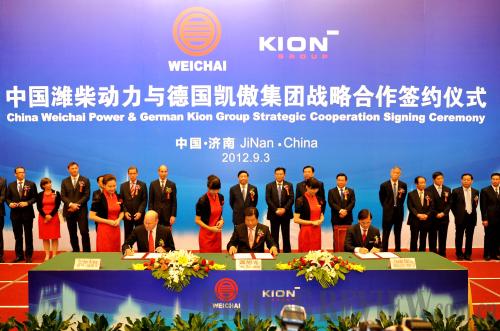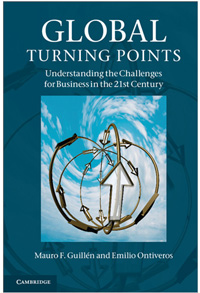|
 |
|
BRANCHING OUT: Representatives for Chinese automotive and equipment manufacturer Weichai Power and German forklift truck maker Kion Group sign an agreement in Ji'nan, capital of east China's Shandong Province, on September 3, 2012. Under the agreement, Weichai Power acquired a 25-percent stake in Kion Group (XU SUHUI) |

The world is becoming a complex and unpredictable place. And the combination of complexity and uncertainty is often volatile, especially for policy makers in business and government who prefer their variables to be kept to a minimum. Some glaring facts in a study of what the next few decades have in store can help describe just how complex our world is becoming. In 2012, 1 billion people were obese, but 800 million suffered from starvation. The world was becoming a more equal place in terms of wealth disparities between countries, but within those countries—between urban and rural groups, professionals and non-professionals, men and women—inequality actually grew. Growth shifted to emerging markets, which were net savers on their capital accounts, while developed countries maintained their high per-capita levels of wealth, but sunk deeper into debt.
 |
|
Global Turning Points: Understanding the Challenges for Business in the 21st Century Mauro F. Guillen and Emilio Ontiveros Cambridge University Press, 2012 |
Academics Mauro F. Guillen and Emilio Ontiveros write in the introduction to their provocative book Global Turning Points that they have worked across disciplines and countries in gathering information on which to base their "turning points." As they make clear, turning points and tipping points are not the same. They are moments of radical change, but they do not mean that something is happening for the better or the worse. They just indicate change. And in the 21st century, the one thing their work does make clear is that change is going to happen to us all whether we like it or not. So the more prepared we are and the more pragmatic our responses, the better the outcomes might be.
Emerging trends
China figures in this story because it is fundamental to most of the "turning points" the authors discuss. "Emerging economies have come to represent more than half of global activity," they state at the head of their first chapter. "They account for two thirds of foreign exchange reserves and are accumulating an additional $2 billion every day." Of this $2 billion, China alone accounts for a half. The brute fact is that in the coming century, the money that emerging and developing countries like China saves will increasingly comprise sources of funds for developed economies. The political and economic arrangements for how this unprecedented new imbalance will be managed will be critical. We are living now in a world where "41 percent of new foreign direct investment flows from emerging and developing economies," as the book states. In that sense, the era of the global dominance of North American, European or Japanese/South Korean companies is coming to an end. In fact, it has already ended.
In terms of sustainability, China's energy and food needs as it becomes a richer country in the coming decades will figure hugely, as will the environmental impact of its growth. While the country uses more renewable forms of energy, its current dependence on fossil fuels without a major technological breakthrough will continue to be the highest in the world. The 21st century will be the century of the city, with over half the world's population moving from the country to urban areas. China approached this particular turning point in 2010, when the national census showed approximately half the country still lived in rural areas, and the other half in cities. The impact of this on the reconfiguration of the economy, on the demands of citizens toward government for public goods, and on educational and development levels, is profound and will take many years to fully work out.
Governance is an issue that this book approaches in detail. States throughout the world are finding the challenge of governing greater. The authors refer to the riots in Britain in 2011, and the protest movements in the United States since 2010. The economic crisis from 2008 dented the faith of many in the regulatory and administrative capacity of their governments. The Group of 20 has become one of the key international forums for discussing issues of the global financial system, but there are questions about how well it can make binding decisions, and how quickly it is able to act. Debate continues about the mismatch between a world economy where emerging economies are becoming increasingly important, but where their representation on bodies like the International Monetary Fund is still too low.
Sustainability is broader than simply looking at energy or food requirements. It is underpinned by the notion that the activities of today should not detract from the rights of future generations to enjoy a stable, prosperous life. The challenge, however, is that in any political culture, selling the long-term benefits of a course of action to the public when there are short-term crises almost weekly takes real leadership. U.S. President Barack Obama in his re-inauguration speech in Washington, D.C. on January 21 spoke of the need to tackle climate change. But his political opponents said he was acting irresponsibly and that human-made climate change was unproven. The simple fact is that the carbon imprint of the average U.S. citizen is twice that of someone in the EU, and three times that of someone in China. The skepticism of many Americans toward tackling climate change might lead to the terrible scenarios of rising sea levels and extreme weather conditions which will affect food supply that Guillen and Ontiveros talk of.
Added to this is simply demographic change. The coming century will see populations age across the world. Already, in many developed countries from Europe to Northeast Asia, those over 60 outnumber those under 20. This trend's impact on social behavior, productivity and the economy is hard to plot. Already, decisions about pension provision and what role the state plays versus individuals are becoming some of the hardest that politicians across the world have to confront. It surprises many, but in China the largest single budget line for the state is not education or healthcare, but pensions.
A polycentric world
What they don't foresee is a world in which, with all these dramatic shifts of economic energy and growth from one part of the world to the other, there will be a waning of the United States, and a replacement of it by China. Rather, they agree with former U.S. Secretary of State Henry Kissinger that the future is going to be less straightforward, and that there will continue to be competing poles of influence and power, with a reduced United States, stronger China, India and Brazil, and the continuation of the influence of the EU.
"During most of the 21st century," they state, "India will be the biggest country in terms of population, China the largest in output, and the United States the richest among the major economies on a per-capita basis." They back this up with statements from the World Bank that in the coming decades, China will be the most important growth pole in the global economy, but not the only one. In that sense we are heading toward a multipolar, polycentric world.
In this era, the greatest challenges that countries will meet will be ones they will be unable to solve on their own. From water security, to food, to climate change, and to their economic development, globalization will reign around them. The key areas that Global Turning Points concentrates on are the labor market and reforms within this to deal with the challenge of aging, urbanization and inequality, the representation system and how people can participate more in the decisions affecting them, the state apparatus and its ability to reform at a time of radical and fast change, and the international system of states where the needs of nations internally have to be balanced against their international role. Change will not be easy in any of these areas, but the choice is simple—either change when we have time, on our own terms, or be forced to change by events, when things are dictated to us. That at least seems simple enough!
The author is an op-ed contributor to Beijing Review and executive director of the China Studies Center at the University of Sydney
Email us at: yanwei@bjreview.com |
